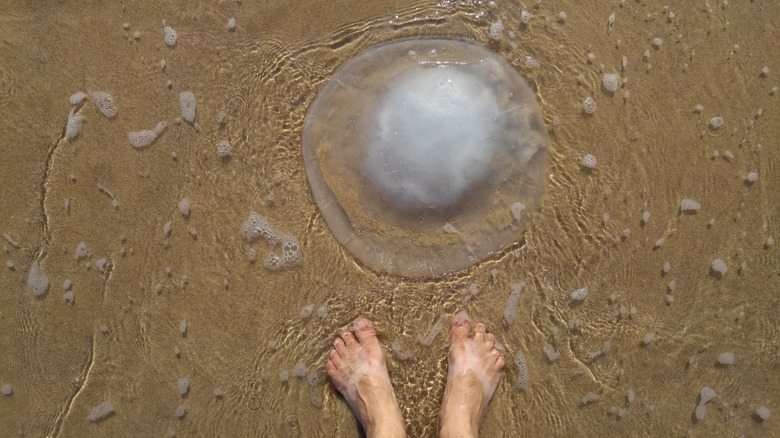
The Myth About Jellyfish Stings You Should Stop Believing
While getting stung by a jellyfish is not a situation most people have to worry about in their day to day lives, it is still a scary possibility for anyone who spends time in the ocean. In fact, over 150 million people get stung by the venomous invertebrate every year, according to The Washington Post. When a person comes into contact with a jellyfish, the sea creature activates tiny cells called cnidocytes that live on its tentacles, which causes them to pop and fill up with water. This pushes the sharp stinger out and into the skin, where it releases venom that causes stinging, itchiness, redness, and swelling in its victims (via Healthline). Jellyfish stings can be serious, even potentially deadly, and they are often very painful.
We’ve probably all heard the old advice about what to do if you do happen to become an unfortunate victim of a jellyfish sting. While it is unsavory and frankly, sort of gross, the most common recommendation for how to treat a jellyfish sting is to pee on it. The myth goes that human urine contains ammonia and urea, which are compounds that have been shown to help alleviate stings in some cases. But before you plan your next ocean adventure, it might be useful for you to know that this myth is completely false, if for no other reason than it might save you from being unnecessarily peed on.
Urine can actually make jellyfish stings worse
According to Healthline, urine is mostly water, which dilutes any potential healing effects the ammonia and urea may have. But peeing on the sting isn’t just useless — it is likely to make things worse. The sodium in the urine may actually aggravate the stingers, causing them to release more venom and make the injury worse.
So what is the best way to relieve a jellyfish sting? Rather than peeing on it, the Cleveland Clinic recommends first removing the tentacles, with tweezers if possible, and then rinsing the affected area with seawater. They do caution against using freshwater, like bottled water, which can actually make the sting worse. Then, it is a good idea to apply apple vinegar or rubbing alcohol to the sting, which can help release the toxins. To alleviate pain, they recommend using a reliever like calamine lotion, hydrocortisone cream, or an ice pack.
So the next time you are in the water, be sure to keep an eye out of the venomous creatures, and maybe keep some tweezers and rubbing alcohol on hand in case of emergencies — and definitely avoid all urine, no matter what the old myth might say.

The Dark Truth Behind The Time Tickling Was Used As Torture

The Surprising Items Bob Marley Is Buried With

The Controversial History Of Father's Day

How Many Victims Did Serial Killer Wayne Williams Actually Have?

The Surprising Secret To Longevity This 111-Year-Old Man Swears By

How This Charming Fruit Bat Is Easing Into Retirement

Creepy Tales Of Prison Ghosts

Rolls-Royce Plans To Build Mini Nuclear Reactors By 2029

The Disgusting Truth About Mao Zedong's Personal Hygiene

Russia Banned From All Global Sport Including Olympics, World Cup
























